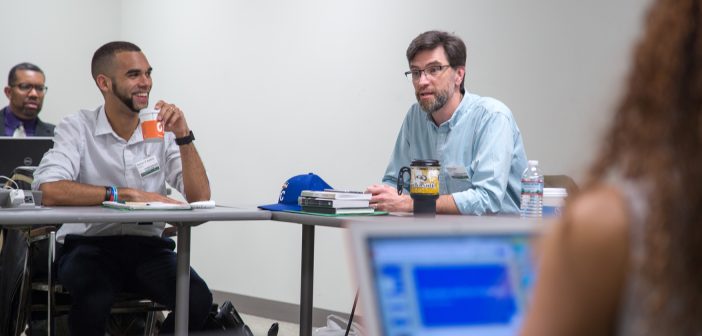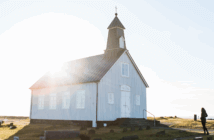When Rev. Nathan Adams was invited to become a Lewis Community Leadership Fellow it was like being asked to come home. “I was a Lewis Fellow five years ago,” he said, speaking of a Wesley program that offers leadership development to clergy under age 35. “I had a great experience. The work was very influential in my ministry, very practical. I really used what I learned.”
Returning as a Lewis Community Leadership Fellow, Adams had the chance to take that process a step further, expanding his focus from the congregation to the larger community.
“Given the pressures of congregational life, pastors and congregations can easily become so focused on their internal life that they fail to engage the community beyond the church,” said Dr. Ann Michel, associate director of Wesley’s Lewis Center for Church Leadership. “The Lewis Community Leadership Fellows program is designed to help pastors who have mastered the basic tasks of congregational ministry ‘lift their gaze’ and become more outwardly-focused leaders.”
That mission was a perfect fit for Adams. “I’d been asking the question, ‘What role can the local church play in transforming the community and revitalizing both the church and the community through government and schools and so on?” he said.
This February, Adams, who serves at Fulford United Methodist Church in North Miami Beach, Fla., participated in the second of three sessions offered to Fellows throughout the year, with a focus on “Engaging Local Schools.”
“We talked about the role that churches and pastors can have in the life of schools and the lives of children and parents,” Adams said. It was especially relevant as his own church is launching an onsite school of its own, with plans to add a grade level each year until they can encompass a Kindergarten to 5th grade curriculum.
“I was really impressed with the partnerships at the churches we studied,” Adams said. “We asked, first, ‘Is there a need? How can we assist the teachers? How can we be in relationship so that, together, our community is really better?”
Adams lifted up that last question as the founding principle of the Lewis Community Leadership Fellows program. “It’s about learning to relate with your community,” he said. “It’s about how we can be in community together, to benefit everyone who calls this place home.”
Highlights of the February session included conversations with school board members and with Pastor Timothy Warner, former chief engagement and partnership officer for Montgomery County Public Schools.
“My job with the county was to create an environment in the school system that allowed folks in the private sector to invest in public schools,” Warner said. “Churches, as institutions, have a vested interest in schools but they often don’t realize that. And schools often have a hard time seeing how churches can help.”
Warner noted that the public school curriculum now reaches far beyond reading, writing and arithmetic. “One big area of focus is social and emotional learning,” he said. “It’s the formation of resilience and grit. It’s creative problem solving. It’s about recognizing the value of failure in the process of learning.”
He finds that church and school leaders often misinterpret the U.S. Constitution’s call for separation of church and state. “The Founding Fathers didn’t intend for the institutions to be separate in their work of serving students,” he said.
“The Constitution makes sure that if you’re a bishop in England you can’t just come over here and be a governor. What the Founding Fathers certainly did want – and everything they did points toward this – is an educated populace.”
As a presenter at February’s gathering, Warner found the Fellows hungry for information. “They needed help refining their vision in local settings,” he said. “Schools are sometimes resistant, congregations can be resistant. Every ministry setting is different. Hashing through those issues is important.”
Together, the group explored best practices for church-school partnerships, and considered how to create and sustain them. “The biggest thing we offer, though, is an intangible called ‘encouragement,’” Warner said.
“It’s good to see that these things are possible and that they happen,” he said. “You develop a network of people who are experts in their field, people with whom you can bounce ideas around. That kind of collaboration can’t be underestimated.”
This article originally appeared in the March 2017 issue of e-Calling from Wesley Theological Seminary.




